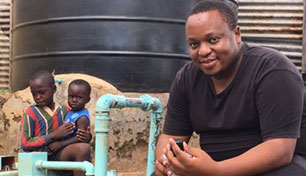A social entrepreneurial solution
A win-win for buyer and seller
Why pay for clean drinking water? We established Safe Water Enterprises as social enterprises so they would one day become self-sufficient and not forever dependent on outside financial support. This means the water is not provided to communities free of charge, but is sold at an affordable price. It also means the Safe Water Enterprises must strike a balance: they must turn enough of a profit to cover the costs of operation and maintenance, but the water cannot be so expensive that people are unable to afford it.
Between for-profit and traditional aid
In many Safe Water Enterprise communities, there are very few opportunities for vocational training. Many socio-economic factors contribute to a relatively low level of education, especially among people living in rural areas. Most water committee members lack experience in running a business and rarely start out with the necessary skills.
To ensure the longevity of the water kiosks, Siemens Stiftung provides kiosk operators with comprehensive technical, entrepreneurial, and economic training in a series of workshops. When Siemens Stiftung eventually pulls back and leaves the kiosks to be fully managed within the community, the training is important for securing the long-term success of a locally-operated business.
Kiosk managers as drinking water experts
The goal to establish the water project as a social enterprise in Africa is a little unusual. On the continent, there is the for-profit sector that targets the base-of-the-pyramid market, and there is the traditional aid model. In the latter, aid programs usually do not adopt an approach that, at the very least, seeks to cover costs. Therefore, it was clear to us that our pilot project marked the start of a learning curve, and that our investment would be considerable until the entrepreneurial model was self-sustaining. At the same time, we believe the only way for our investment to achieve long-lasting impact is through a solution that is, in the end, self-sustaining.
Three questions for Paul Njuguna
How is the price for a liter of water determined?
The price of water is set locally. An indicative price is the existing price that the municipality already pays for water from other sources. However, as local consultants to the Siemens Stiftung, we ensure that the price is low enough to be affordable for the community members and sufficient to maintain the operation of the kiosk.

Who is the owner of the kiosks?
The kiosks are owned by local community members who form a management unit. These management units are always local non-profit organizations that represent members of the entire community within the village. Usually there is either a Self Help Group (SHG) at the lower level, or a Community Based Organization (CBO) at the higher level. In most cases we recommend upgrading the SHG to CBOs to make the management of the kiosk more stable and thus more sustainable.
How long does it take until for kiosks to sustain themselves without your support?
This depends a lot on the operator and the strength of the committee representing the Community Unit (CBO or SHG) that manages the kiosk. We have seen that kiosks with a strong board are able to manage themselves within 8-12 months. During this time, they will complete our support training, which we call Safe Water Enterprise Community (SWEC) training. This training, combined with a dedicated operator supported by the CBO, has proven to be very successful for us. The regular and appropriate payment of the operator is also essential for his motivation.
When ideas inspire others...
In Kenya, we work with communities to develop water kiosks for safe drinking water. This often leads to additional activities undertaken by locals. For example, hospitals like the Health Center in Ngoliba or the Nyangoro Health Center use the kiosks to provide safe drinking water for their patients. Hotels and businesses in the region do the same for their customers. In Kisumu, the kiosks subsidize water sales for the local community with water sales to hotels and businesses in urban areas. Even in the very remote kiosk in Kwale on the Kenyan coast, water is sold to local bars and restaurants. Transport businesses have sprung up to cover water deliveries to remote areas using bicycles, donkey carts, and motorcycles. These activities support small local businesses in addition to making a positive contribution to local health.
Christine Meinhardt
+49 9131 9207 913
Stephen Njuguna Wamuyu
+254 722 912 574


